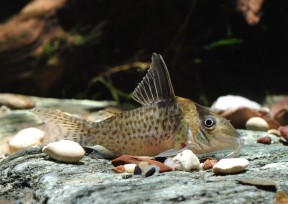Corydoras brevirostris
Spotted Cory
SynonymsTop ↑
Corydoras melanistius brevirostris Fraser-Brunner, 1947
Etymology
Corydoras: from the Ancient Greek κόρυς (korus), meaning ‘helmet’, and δορά (dora), meaning ‘skin, hide of an animal’, in allusion to the rows of bony plates on the flanks of genus members.
Classification
Order: Siluriformes Family: Callichthyidae
Distribution
C. brevirostris was described from an aquarium specimen apparently exported from the Río Orinoco drainage in Venezuela, and its wider distribution is somewhat vague, usually being given as the Orinoco system plus unnamed coastal rivers in Suriname.
This represents a somewhat disjunct pattern of distribution and if correct the species is also likely to occur in Guyana.
Maximum Standard Length
55 – 60 mm.
Maintenance
Ideally use a substrate of fine sand, although rounded gravel is an acceptable alternative provided it’s kept scrupulously clean.
Other décor is largely down to personal choice, but some cover should be provided to give the fish security.
Water Conditions
Temperature: 20 – 26 °C
pH: 6.0 – 7.5
Hardness: 36 – 215 ppm
Diet
Corydoras spp. are foraging omnivores and will accept most sinking dried foods, as well as small live and frozen varieties such as bloodworm, Tubifex, etc.
Feeding a varied diet will ensure the fish are in optimum condition.
Under no circumstances should they be expected to survive on ‘left-overs’ from other inhabitants of the aquarium or relied on to ‘clean’ the aquarium.
Behaviour and CompatibilityTop ↑
Peaceful and gregarious. Should be maintained in a group of at least 4-6 individuals.
Sexual Dimorphism
Females tend to grow larger, and sexually mature individuals are noticeably rounder and higher-bodied than males.
NotesTop ↑
This species is one of a number of similar-looking congeners including C. melanistius, C. delphax and C. ephippifer, all of which are tricky to tell apart from one another and have been widely misidentified in aquarium literature.
Generally-speaking C. brevirostris can be identified by a combination of relatively short, rounded snout and presence of dark bars in the caudal-fin.
C. wotroi Nijssen and Isbrücker, 1967 is sometimes considered a synonymous with C. brevirostris but recent authors (Reis et al., 2003; Ferraris, 2007) have placed it in synonymy with C. melanistius and that system is followed here.
The genus Corydoras is among the largest catfish groups and currently contains over 150 valid species.
It is included in the family Callichthyidae, of which members are often referred to collectively as ‘armoured’ or ‘mailed’ catfishes group due to the presence of bony plates in place of scales on the body.
Their taxonomy can be confusing, and numerous undescribed species are also thought to exist.
Fish of unconfirmed identification entering the aquarium hobby are therefore typically assigned a ‘C‘ or ‘CW‘ number for purposes of reference and organisation.
They are facultative air breathers and possess a modified, highly vascularised intestine which has evolved to facilitate uptake of atmospheric oxygen and aid survival in oxygen-deprived environments. In the aquarium you’ll occasionally see them rising to the surface to take in gulps of air.
The stiffened pectoral-fin spines are capable of piercing human skin and a ‘sting’ can be very painful indeed, so care should be exercised when handling them.
It is thought that secretions from the axillary glands at the base of each spine may even be mildly toxic or venomous.
References
- Fraser-Brunner, A., 1947 - Proceedings of the Zoological Society of London 117(1): 241-246
New fishes of the genus Corydoras. - Reis, R. E., S. O. Kullander and C. J. Ferraris, Jr. (eds), 2003 - EDIPUCRS, Porto Alegre.: i-xi + 1-729
Check list of the freshwater fishes of South and Central America. CLOFFSCA. - Ferraris, C. J., Jr., 2007 - Zootaxa 1418: 1-628
Checklist of catfishes, recent and fossil (Osteichthyes: Siluriformes), and catalogue of siluriform primary types. - Fuller, I. A. M., and H-G. Evers, 2005 - Verlag A.C.S. GmbH: 1-384
Identifying Corydoradinae Catfish. - Grant, S., 1998 - The Aquarist and Pondkeeper 62(10): 41-45
Descriptions of two new species of Corydoras, Lacepede, 1803 (Pisces, Siluriformes, Callichthyidae).



